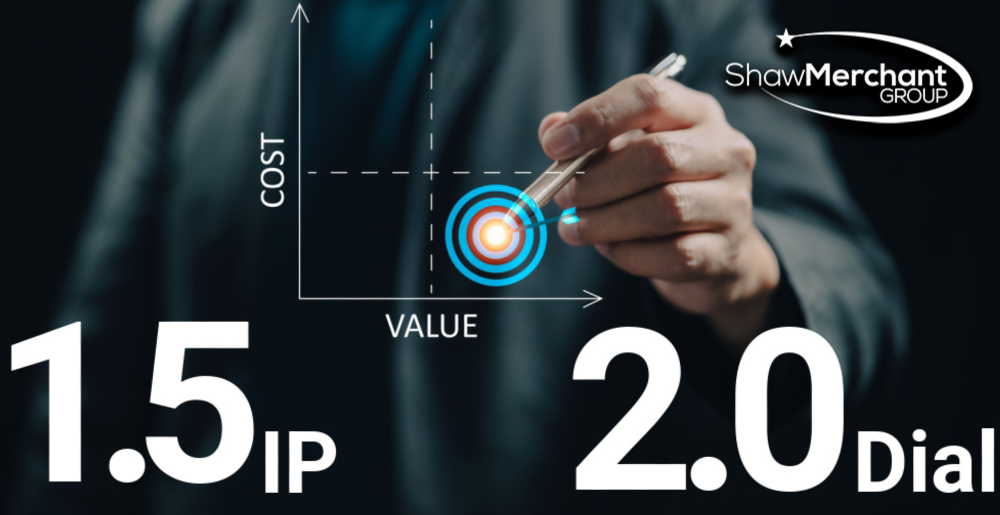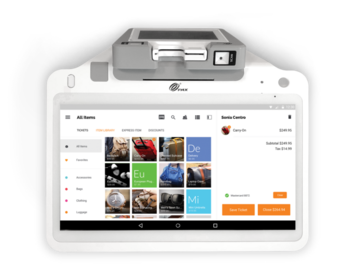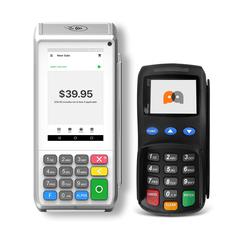Sunday, November 19 2023
In today's digital age, accepting credit card payments has become a necessity for businesses of all sizes. As a result, the demand for merchant services providers has skyrocketed. If you are interested in tapping into this lucrative market and starting your own merchant services business, you've come to the right place. Sunday, November 12 2023
If you are a merchant that is discussing the possibility of enrolling in a cash discount program to save you money on your processing, then you are no doubt wondering what to expect and whether it's a good decision for your business. Every decision that you make concerning your business must be made carefully. You care a lot about your business and you would never want to endanger it by making a decision too early or without enough consideration. If you want to truly get the most out of your merchant services experience, then you must at least explore the possibility of enrolling in a cash discount program. However, you might not even know where to start. If you’ve never enrolled in a cash discount program, you probably don’t know what to expect or how the program could affect your business. We are here to provide you with some guidance and give you the information that you need to make an informed and well-timed decision for your business. In this overview of the cash discount program, we’ll provide a fair and balanced summary of the benefits of the program and also show you some of the potential downsides. What is a Cash Discount Program? If you run a business, you are probably familiar with cash discounts. However, cash discounts have become a dying practice. This is mostly because processing cost have put a burden on businesses and they would rather keep the extra margin from the cash to help fund operations. However, a cash discount program offered by a merchant services company is a completely different concept that has been helping to restore these programs across the country. A modern-day cash discount program is the same in theory as the "cash discounts" of the past in that it incentivizes the customer to pay with cash to provide them with a cheaper price. However, it is much different in the way that the savings are applied. With a traditional cash discount offering, a percentage of the transaction would be deducted from the total when customers choose to pay with cash. This saves the customer and the merchant each a little bit of money, but nothing significant. In a merchant services cash discount program, the rate is applied to any transaction that is being paid with plastic. The advertised price on your products and services will be paid if the transaction is paid in cash. This passes the cost to those that choose to pay with credit cards and saves the merchant money on processing. Benefits of Cash Discount Programs As you can ascertain from our summary of cash discount programs, there are quite a lot of benefits to like about cash discount programs and what they have to offer for businesses that use a lot of processing services. Here are some of the benefits that you can enjoy when you choose a cash discount program for your business. Lower Cost: When you accept fewer card payments as a merchant, it will inevitably mean that you are paying less in processing cost. Processing cost don't sound like a lot at first, but they can certainly pile up and make a difference in your balance sheet. If you want to avoid processing cost as much as possible, then the best way to do so is to enroll in a cash discount program with your merchant services provider. The main benefit of a cash discount program from the merchant's point of view is that it enables the merchant to pass on the cost to the consumer through a cash discount program. This leaves the merchant with basically no cost to pay in the end. Easy Implementation: Many merchants shy away from these sorts of programs because while they would be beneficial for the merchant, many fear that they are difficult to implement. Without the right partner, this might be the case. However, if you choose the right merchant services partner, the implementation can be incredibly easy and painless. Most merchant service providers will provide their merchants with signage to explain the switch and guidance on how to change the process without angering customers. In addition, merchants might be able to gain access to free POS equipment to assist in the system change. More Cash Payments: When you implement a cash discount program, it only stands to reason that you will start to incentivize more cash payments. More cash payments mean savings for your customer and more margin for you. Once the merchant's customers realize that they can save money by paying in cash, they will be incentivized to do so and it will ease the burden that processing and card payments have on your business. In addition, the business can charge just as much as it was before the switch for the products, except they will not have to adjust for processing cost. Merchant Fraud Protection: With fewer credit card transactions going through your business, you will also be opening yourself up to less fraud and chargebacks. One of the most common issues with credit card payments is the fraud that often occurs in credit card transactions. When a merchant is accepting more cash than cards, the chances of fraud, and the cost to your business decreases with every transaction. Drawbacks to Cash Discount Programs Though there are many benefits of using a cash discount program, there are also drawbacks that prevent some businesses from making the leap. One of the most common reasons for hesitant businesses is the fact that not many consumers prefer to use cash in the modern era. Many transactions are done exclusively with credit cards, and many consumers even dislike using cash altogether. Forcing customers to use cash to get the cheaper price could put your relationship with them at risk. This risk can be mitigated by making it clear why the program is in place, how it benefits both consumer and merchant, and how easy the process is. With open communication, participating in a cash discount program should be a breeze for your business. Wednesday, October 18 2023
Merchant services sales is one of the hottest and most lucrative sales industries on the market right now, and for that reason it is incredibly attractive. It is true that you can earn great money being a merchant services agent, but it often requires a strict training program and dedication to the craft. If you want to be successful in merchant sales, then there are some key pillars that you will need to be familiar with that will help you to succeed and thrive in merchant services sales. By following this crucial training structure, you can set yourself up for success in the merchant services industry. Pursue a Quality Partnership The first concept that you will need to be familiar with in your merchant services sales training regimen is that you should pursue a quality partnership and arrangement with a merchant services provider. As a merchant services salesperson, you will work under the umbrella of a merchant services provider that will be the backbone of your business. The partner that you choose will administer these services to the merchants that you sell to, so it’s very important that you find a merchant services provider that is reputable and can provide you with all the benefits that you need for success in the merchant services industry. There are a few things that you should look for in a quality partnership with a merchant services provider such as prompt payment, good payment structure, frequent bonuses, large share of profits, quality support staff, solutions for every industry, and tools to help you succeed. A quality partner that can provide you with all of these things is one that can help catapult you to success in merchant services and enjoyment of a life that earns passive income. It’s critically important that you make the right decision when it comes to the merchant services provider that you choose. Optimize Your Pricing Structure While sales is mostly about making connections with businesses and selling your products, there are a lot of other things that you can do to help yourself have success. One of the more subtle things that you can do is to optimize your pricing structure to provide you with more margin and more opportunities to increase your revenue. There are several ways that you can do this by offering upsells, sticking to strict limitations when offering discounts, and others. While a change in your pricing structure might not make a large effect right away, when the effects are compounded over hundreds of transactions, you can notice a very large difference that will greatly impact the trajectory of your merchant services career. The More Options, the Better When you are going through the preliminary stages of training to be a merchant services agent, one of the most important things that you should be on the lookout for is a merchant services provider that doesn’t limit you by their payment processing capability or options. You should seek to work with a merchant services partner that provides you with a wide range of payment processing options such as debit, credit, cash, ACH, and others. When your partner offers these additional methods, you can offer them to your merchants. Merchants like to be presented with multiple options and flexibility, so if you can offer them flexibility in their payment processing solution, then they are more likely to work with you for their merchant services needs. Providing Good Customer Service One of the most important lessons that you will learn in merchant services sales training is that customer service should be your main priority at all times. The customer is the most important party in the entire transaction and without happy customers as your merchants, you will find a very hard time succeeding in merchant services sales. Providing good customer service is something that you will have to master if you want to get to the point where you are converting more customers and increasing your portfolio of merchants. To do this, you should be sure to always be attentive to customers’ needs, answer questions in a timely manner, and be able to get in touch with them whenever they need something from you. However, you are not the only important person in the process when it comes to customer service. You should be partnering with a merchant services provider that also values the power of good customer service if you want to have success in merchant services sales. This means evaluating how well your merchant services provider is able to meet the needs of customers and what their reputation is for providing service to the merchants that they oversee. If you can provide a good customer service experience to your merchants, then they are much more likely to continue coming back to you time and again for their processing needs. Free Terminals Included If you want to have success in merchant services sales, then you’ll quickly learn one of the secrets of the industry is to include a free terminal for your merchant. Not only do merchants love to have free bonuses included in their processing packages, but you’ll also be providing your merchant with a POS that is specifically designed to increase performance and efficiency while using your offering of processing solutions. With a terminal that is specifically designed to help your solution work in the best way possible, you can be sure that they are getting the best possible user experience that they could want. This also helps your relationship with the merchant. Providing them with incentives is one thing, but they can take additional confidence in knowing that they are partnered with an agent that cares enough about their merchants to ensure that they have the proper equipment to get the job done the right way. If you want to increase your conversion rate and improve the quality of your relationships with your merchants, then offering a free POS system is a great way to do so and is now considered industry-standard. Saturday, September 02 2023
Credit card processing residual income is a type of passive income that is generated by selling merchant services and processing credit card payments. In essence, it is the commission earned by an individual or company for referring merchants to a payment processor or acquirer. This residual income is typically paid out on a monthly basis and is based on the volume of transactions processed by the referred merchants. Tuesday, June 20 2023
If you are a first-time or small business owner, then you may have heard of flat-rate credit card processing. Every business needs a provider for credit card processing, as it is one of the most important aspects of any business--the ability to accept payments. However, choosing a provider and a fee structure can be a challenge that takes time, energy, and research. If you’re going to succeed, then you need to be familiar with every type of processing service and why they might be suitable for you. One of the most popular services purchased by small businesses when it comes to credit card pressing is flat-rate credit card processing. Flat-rate credit card processing has many benefits, but it's not the right situation for every business. This brief analysis of flat-rate credit card processing will give you some insight that helps you decide whether flat rate credit card processing is the right option for you, or if it's a bad choice for your specific business. Credit card processing isn’t always the easiest concept or industry to understandAs a business owner, you are already aware of some of the struggles that you can experience when trying to determine a credit card processing provider. It is one of the most difficult things to do as a business owner, especially if you are trying to estimate the cost of accepting credit cards using a merchant services provider. Determining these costs can be difficult, which is why some business owners are drawn to a flat-rate processing model where the pricing is easier to understand. However, these decisions depend on so many factors that it becomes a time-consuming task to determine which pricing model is best for you. To make it easier, this article will serve as a knowledge base and guide to helping you understand the factors that go into this decision and what concepts you need to understand. Definition of flat-rate credit card processingThe first important concept of payment processing to know is what exactly flat-rate payment processing is. If you’re going to determine if it is the right choice for you, then knowing what it entails is the first and most important step. With an understanding of what flat-rate credit card processing is, you’ll be well on your way to understanding it at a deep enough level to decide whether it is the right choice for you. Credit card processing isn’t free. It costs the merchant a fee to implement and accept payment processing solutions. The variable here is what the cost is. Just like in any purchase, there are varying costs from different providers. Though consumers don’t consider it, it is the reality of being a business owner. In addition to trying to find the lowest fee, merchants also face the possibility that credit card processing fees will vary within the credit processing provider that they choose. One of the most significant and common reasons for credit card processing fees to fluctuate is the various fees charged by Visa, Mastercard, and other suppliers for using the card. In addition, there are fees charged by the issuing bank for the transaction and there are a couple more mouths to feed along the way. There are hundreds of services that are involved in this process and each one takes a different sized bite. For this reason, credit card processing fees can often fluctuate and have business owners confused about what they are actually paying to process credit card transactions. To simplify things and make it easier for the merchant to understand, some of the best credit card processing companies have begun to offer flat-rate credit card processing fees. With flat-rate credit card processing fees, merchants are more able to predict exactly what the cost of accepting credit cards will be and forecast that into their profits and margin calculations. It comes with many benefits, but it’s not right for every business. Benefits of flat-price processingAs you can imagine, there are many benefits to flat-rate processing and that is why it is so commonly used by businesses that are seeking simplicity in their processing arrangements. When you have flat-price processing, there are a few aspects to love about your credit card processing agreement. PredictabilityThe first benefit of using flat-rate credit card processing is being able to have a predictable credit card processing fee each month. With predictability in the rates that you are charged to process credit card transactions, you can not only plan your expenses better, but you can also price goods and services better to provide you with a more consistent margin. When you know what your processing rate is going to be, the need to fluctuate your item pricing will disappear. You can plan ahead and be sure of what you are going to be charged to process credit card transactions. FlexibilityWhen you have a flat-rate processing plan, another benefit that you will be entitled to is the flexibility that comes with these processing plans. With flat-rate credit card processing plans, you often don’t have to get locked into long-term commitments that hinder your flexibility and make it difficult to plan ahead. For small businesses looking for short-term credit card processing or to lessen the long-term overhead for their business, this is the ideal situation. Flexibility is also a benefit to any business that might be considered high-risk or in general need of agility due to possible changes in the business model, revenue, and other aspects affecting their business. SimplicityWhen you work with a flat-rate credit card processing contract, one of the most important benefits is the simplicity of the contract. As we touched on earlier, traditional credit card processing agreements will often feature clauses, charges, and fees that you don't even have access to seeing the details on. For this reason, in those arrangements, you can never tell exactly what your credit card processing fee will end up being. However, with a flat-rate processing plan, you can always understand what the fees are and exactly how they impact your business. You can plan to include enough margin for your processing fees and make it easier to understand the implications of your credit card processing agreement. Who is a good candidate for flat-rate processing?If you are considering flat-rate processing for your business, you probably want to know a bit more information about who is a good candidate for flat-rate processing and which businesses should pursue flat-rate processing for their processing needs. It is very easy to identify merchants that are good fits for flat-rate processing because of the straightforward nature of flat-rate processing. StartupsStartups are the ideal businesses for flat-rate processing because they usually need to have less overhead and a shorter contract. Startups are often young and unstable, so having a processor that is flexible in the terms is ideal. Startups also typically have a lower volume of transactions. Many credit card processing companies have solutions that are specifically geared towards the needs of startups and young companies. Small BusinessesSmall and local businesses are another frequent customer of flat-rate processing solutions. This is because small and local businesses typically have a much lower volume of transactions than larger companies and they are unable to attain better rates. In addition, small businesses are slightly more unstable and higher risk than other companies and don’t have the leverage to get favorable contracts with other processing solutions. High-Risk BusinessesBusinesses that are higher risk industries also tend to use flat-rate processing because they are subject to riskier transactions that could lead to increased fees by processing companies. If they are able to get an account with a flat-rate processor, then high-risk businesses typically take that opportunity because it is a favorable situation for them. Doing better than flat-rate processingFor some, flat-rate processing simply isn’t a great option. This leaves many wondering if it’s possible to get a better deal than flat-rate processing. It’s true, there are some downsides to flat-rate processing and that is the reason that some choose to pursue other options. It is possible to get a better deal than flat-rate processing has to offer, but there are certain conditions that you have to meet. The first condition that you have to meet if you want to get a better deal on your processing than what flat-rate processing has to offer is that you have to be able to do a high volume of transactions. The higher the volume, the better deal you are going to get on your processing. Another condition that you will have to meet if you are going to get a better rate than what most flat-rate processing solutions have to offer is you will most likely have to sign a longer-term contract for your processing needs. This means less flexibility, but it is possible that you will get a better rate, though it will be dynamic and subject to change. If you are a business that cannot get flat-rate processing or you do a high volume of transactions for an established and long-lasting business, then you can possibly get a better deal by going with a solution other than flat-rate processing. Friday, June 16 2023
If you are looking to find out whether you actually own the residual portfolio that you are building, one of the best ways to do so is to ask the processor that you are working with to purchase some of the future residual. This is known as a buyout and it’s a very common step for agents to take when they are in need of quick cash from the sale of an asset like a residual portfolio. If you want to be able to take advantage of these buyouts, you need to be very familiar with what a buyout is and how it can be completed from your side. This guide to the process of selling merchant account residual portfolios can give you the knowledge that you need to conduct a transaction like this and get access to the funds you need Background residual knowledgeIf you are going to sell your merchant portfolio, one of the most important things that you will need to know is the background of residuals and how they work in order to determine the price that you might get bought out at. Most agents already know how residuals work--you sell merchant accounts and in return, you get a share of the income. For many merchant processing contracts, the merchant’s share of the income is about 50%, leaving the merchant with the other 50%. However, it isn't always the ideal situation for the agent to wait for their income on a monthly basis and some prefer to cash out their earnings up front. A buyout between the agent and the merchant processing company gives them the opportunity to do this and pursue whichever avenue they might want with their lump sum of cash. How much can you get for your residuals?If you are considering selling your share of a residual contract, then you also probably want to know what your earnings potential is from selling your share in these often steady and lucrative agreements. Generally speaking, a processor will pay 15 months worth of residual payments on your part in exchange for your 50% of the residual share in the merchant processing account. This means that the lump sum that you would be getting is 15 times the size of the monthly residual that you would otherwise be gathering from holding the contract. There are benefits and drawbacks to this. Benefits of selling your residual shareThere are a few possible benefits to selling a share that you have in a residual contract that continues to feed you money. The first is that you need quick access to cash. If you do, then this is one of the best ways to do it. A buyout comes with no obligation to pay back or pay interest--it is your money that you earned and you get to keep it. Another benefit of selling your residual share is that you might get something in exchange for nothing, so long as you are planning on leaving the merchant processing industry. If so, then it’s a win for everybody. You will get to be paid 15 months for a merchant processing residual that you would otherwise not be getting due to you leaving the business. In exchange, you will hand over the asset that you do have to the merchant processing account where they will continue to collect residuals on the account. The final benefit is that the payout of a merchant services residual contract buyout is actually pretty competitive, compared to what you might otherwise get with a fast lending service or another service that doesn’t have your best interests in mind. The payout of a buyout is guaranteed and you get a good rate. So, if you are in need of an injection of capital for a venture, debt, or any other purpose, selling your share of a residual contract might be the right choice for you. Drawbacks of selling your residual shareJust as there are benefits to selling your share in a residual contract, there are also downsides. One thing that you should be aware of if you are considering selling your share of a residual agreement is that you will not ever be able to get this contract back and earn the residuals for yourself. Once you have been bought out, the movement is permanent. The merchant processing company will not give you a chance to get back into it once your financial situation becomes less muddy and you want to get back in the game. That’s not to say that you can’t close new clients, but you won’t be able to work with the clients that you sold to the merchant processing company. In addition, selling your merchant account portfolio van be a bad financial decision. Though it’s tough to assess this because everyone is in a unique situation, the theory is that residual income is basically a guaranteed passive income stream, after the setup is complete. So, how much does a few hundred extra dollars a month mean to you? Without the share of the residual income, you are left with a lump sum, which isn’t so bad. However, it does leave a gap in future wealth generations and could make it harder for you to survive financially in the long-term. When to use a buyoutAs a young agent, there are probably multiple situations in which you feel a buyout of an asset might be the right decision for you. However, buyouts from residuals should only be used in some situations. One such situation is if the agent needs a sudden influx of cash to replenish savings or consolidate a debt. Another reason is if a merchant services agent or ISO has a large upcoming business expense that they want to make sure they have the freedom to invest if they so choose. With this flexibility, merchant services agents and ISOs are well-positioned to emerge stronger than ever from any situation that they find themselves in. Contact Shaw Merchant Group Partner Program to get a full evaluation or your merchant account residual buyout. Get up to 40 times your monthly residual to buy sell your credit card processing accounts. Friday, May 12 2023
Are you planning to become a merchant service provider? When it comes to selling merchant services, there are thousands of ISO agent programs for you to choose from. It is very exciting to become a merchant services provider. However, without the necessary information and details, it is very easy for you to fail. The merchant services business is both complex and lucrative. There are several ISO agent programs available. Choosing the one to suit your specific needs can be very tricky, but luckily we are going to give you expert advice and tips on choosing the best one. Some factors to consider in order to become a merchant service provider include the tools offered by the company you chose, technology use, and customer supports. This article paints a clear picture of what a great ISO agent program should look like. 9 Characteristics of a Good Merchant Service ISO Program The following are some of the key characteristics that define a reliable ISO agent program. A company with the following traits increases your chances of being successful in your credit card processing business. Exceptional Customer Service This is one of the most critical characteristics of a good ISO agent program. However, it is one of the most overlooked things when an agent wants to become an ISO and when seeking out an ISO partner. In the merchant services business, the worst-case scenario would be to receive complaints from your clients, and you are unable to get in touch with your merchant services partner. This can really ruin your business. It is a great practice to look for an ISO agent program that provides 24/7 customer support. In addition, the customer care representatives should be able to attend to any questions, both general and technical, within the shortest time possible. Same-Day Funds Deposits This is another important feature to look out for when choosing a ISO agent program. Clients do not have to wait for long to get their funds deposited into their bank account when a transaction is made. The same day funding is a great incentive that will leave your clients happy and also help you when promoting your business. Ability to Handle High-Risk Merchant Accounts Though you might not be dealing with clients who have high-risk transactions such as travel agencies, CBD companies, bail bonds, credit collections, medical marijuana, etc. it is important for the ISO agent program you choose to handle high-risk merchant account. You might get clients who operate high-risk operations, and therefore the benefit of this is to ensure that the business of your clients is running smoothly without any payment glitches. Great Discount Opportunities The fees associated with credit card processing are quite high. These high fees have been causing businesses to scramble. The cash discount or dual pricing program enable merchants to implement a service fee to customers who pay via credit card and issue discounts to those who pay via cash. The merchant does not have to pay a fee for each transaction they run, and therefore this saves them money. You should, therefore, ensure you find a ISO agent program that offers these opportunities. Assistance on Marketing When it comes to credit card processing business, marketing can be the hard part. However, with a great team behind you to offer marketing assistance, it becomes easy. For you to turn cold leads to warm leads, you will need an effective plan or hire a marketing team. They will assist in providing marketing information as well as design on marketing brochers ect. Flexible Compensation PlanGetting paid is one of the most important steps as a merchant services provider. It is critical to get compensated for the work and effort you put into your merchant services business. Look out for a ISO agent program that will help you realize your goals and meet your needs. Note: Pay attention to the agreement document to make sure you understand all the details. Residual Income TrackingA good ISO agent program will help you get residual analytics; this is very important for your business. The use of technology and the latest software to track residual income is a must for a good ISO agent program that you are going to choose. You should be able to see, at a glance, these details: number of clients, average profit, average ticket, top 10 merchants, and more. Infrastructure For the success of your credit card processing business, it is critical to look for an ISO partnership who readily avails the necessary infrastructure to you. The payment technology is very dynamic, and each year, there are new changes and improvements. There are several other payment methods that have come up. A good ISO agent program should give you access to these assortments of payment processing products. All these will give your clients payment processing options to choose from, which helps them to run their business smoothly. A good ISO agent program should be in the capacity to support most of the following infrastructures:
Multi Relationship with Various Banking Options A great ISO agent program should facilitate a solid relationship with several banks. This creates options to resort to incase one bank declines an account. With this feature, you will have peace of mind and be able to easily close deals and get paid. |
Becoming a merchant service provider can be a lucrative and rewarding career choice. As a merchant service provider, you will be responsible for helping businesses accept debit and credit card payments, as well as providing other financial services. To become a successful merchant service provider, there are several key steps you need to follow. In this comprehensive guide, we will outline the process of becoming a merchant service provider, including the necessary qualifications, skills, and steps to take to launch your business. |



























